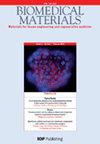Surface engineered nanodiamonds: mechanistic intervention in biomedical applications for diagnosis and treatment of cancer
IF 3.7
3区 医学
Q2 ENGINEERING, BIOMEDICAL
引用次数: 0
Abstract
In terms of biomedical tools, nanodiamonds (ND) are a more recent innovation. Their size typically ranges between 4 to 100 nm. ND are produced via a variety of methods and are known for their physical toughness, durability, and chemical stability. Studies have revealed that surface modifications and functionalization have a significant influence on the optical and electrical properties of the nanomaterial. Consequently, surface functional groups of NDs have applications in a variety of domains, including drug administration, gene delivery, immunotherapy for cancer treatment, and bio-imaging to diagnose cancer. Additionally, their biocompatibility is a critical requisite for their表面工程纳米金刚石:癌症诊断和治疗生物医学应用中的机理干预
就生物医学工具而言,纳米金刚石(ND)是一种最新的创新技术。它们的尺寸通常在 4 到 100 纳米之间。纳米金刚石的生产方法多种多样,并以其物理韧性、耐久性和化学稳定性而著称。研究表明,表面修饰和功能化对纳米材料的光学和电学特性有重大影响。因此,NDs 的表面功能基团可应用于多种领域,包括给药、基因递送、癌症治疗的免疫疗法和诊断癌症的生物成像。此外,其生物相容性也是其体内和体外干预的关键必要条件。本综述深入探讨了这些方面,并重点介绍了最近在围绕癌症诊断和治疗的各种生物医学应用的玖龙纸张表面改性策略方面取得的进展。此外,还讨论了其临床转化的前景。
本文章由计算机程序翻译,如有差异,请以英文原文为准。
求助全文
约1分钟内获得全文
求助全文
来源期刊

Biomedical materials
工程技术-材料科学:生物材料
CiteScore
6.70
自引率
7.50%
发文量
294
审稿时长
3 months
期刊介绍:
The goal of the journal is to publish original research findings and critical reviews that contribute to our knowledge about the composition, properties, and performance of materials for all applications relevant to human healthcare.
Typical areas of interest include (but are not limited to):
-Synthesis/characterization of biomedical materials-
Nature-inspired synthesis/biomineralization of biomedical materials-
In vitro/in vivo performance of biomedical materials-
Biofabrication technologies/applications: 3D bioprinting, bioink development, bioassembly & biopatterning-
Microfluidic systems (including disease models): fabrication, testing & translational applications-
Tissue engineering/regenerative medicine-
Interaction of molecules/cells with materials-
Effects of biomaterials on stem cell behaviour-
Growth factors/genes/cells incorporated into biomedical materials-
Biophysical cues/biocompatibility pathways in biomedical materials performance-
Clinical applications of biomedical materials for cell therapies in disease (cancer etc)-
Nanomedicine, nanotoxicology and nanopathology-
Pharmacokinetic considerations in drug delivery systems-
Risks of contrast media in imaging systems-
Biosafety aspects of gene delivery agents-
Preclinical and clinical performance of implantable biomedical materials-
Translational and regulatory matters
 求助内容:
求助内容: 应助结果提醒方式:
应助结果提醒方式:


